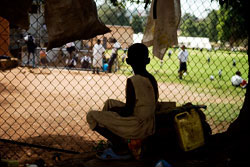

KAMPALA, Uganda (WOMENSENEWS)–Rwanda’s post-conflict recovery has a number of impressive signposts.
One is the economy, which grew at an annual rate of about 11 percent last year, according to the country’s national bank.
Another is the political empowerment of its women. In 2008, Rwanda elected the world’s first majority-female parliament and today a woman leads the country’s Supreme Court. One third of the cabinet of President Paul Kagame is female.
Most recently is the April agreement–among Rwanda, Uganda and the U.N. High Commissioner for Refugees–to target July 31 as a date to repatriate over 30,000 Rwandan refugees in Uganda. It’s a sign that the three authorities consider Rwanda sufficiently stable and prosperous enough to begin closing the country’s post-genocidal chapter.
But Moses Crispus Okello, head of research and advocacy at the Refugee Law Project, a nongovernmental organization in Kampala, finds little consolation is these milestones, particularly not the new repatriation target date.
Okello says repatriation is alarming for refugees and that women have special economic, health and safety concerns.
Most Rwandan refugees live in four large settlement camps in southwestern Uganda. However, others have made lives for themselves in Uganda’s urban centers, such as Kampala.
U.N. Withdrawing Support
The repatriation process began in 2003, but was not taken seriously, according to Uganda’s Office of the Prime Minister. Now the Office of the Prime Minister has said that transportation to Rwanda will not be guaranteed for refugees who leave after the July 31 target deadline. The U.N. will also begin withdrawing support for Rwandan refugees in the camps in August, according to the Tripartite Agreement, which means a disruption in routines that many refugees have been following for years.
Okello says domestic violence could rise and women will lose financial security as they leave the land they have been farming at the camps, which gave their families a source of income.
During the transition back to Rwanda, they could be particularly vulnerable to high rates of poverty, since many women returning to Rwanda have described difficulty in accessing the land their families left behind, he says.
Another major concern is that Rwandan women–disproportionately vulnerable to HIV in the camps due to sexual violence–might lose access to the free antiretroviral drugs the Ugandan government provides through public hospitals and clinics.
Although Rwanda runs public programs that distribute the drugs free of charge, many women fear that their access to the medication will be interrupted as they move through the transit camps and back to their former homes.
Clarifications Sought on Repatriation Process
The Refugee Law Project recommends that the Ugandan government and U.N. clarify the voluntary nature of the repatriation and inform refugees about alternative options if they are unwilling to return to Rwanda.
Despite the general prevalence of peace in Rwanda–and diplomatic assurances of protection for those returning–individual refugees have legitimate concerns about their safety, the project said in a recent press statement.
It also pressed the U.N. to continue assistance for refugees who decide to stay, particularly since all Rwandan refugees in the camps have been advised to stop farming.
Over 2,800 Rwandan refugees were repatriated as of July 10, according to the country’s Office of the Prime Minister.
But the Refugee Law Project and news reports say that many of those have reversed course and come back to Uganda, citing poverty, loss of their families’ land and fear of being wrongly accused of genocide.
Most of the refugees in the Ugandan camps are Hutu, the ethnic group whose leadership helped plan and execute a genocide that killed between 800,000 and 1 million Tutsis and moderate Hutus in 1994.
Charges of False Accusation
"In the past, the Rwandan government has accused the refugees in Uganda of being genocidaires," said Okello. "Some unscrupulous people also used the courts that were trying genocide suspects to amass property of those who had left Rwanda, linking them to the genocide. When they returned, they would accuse them of genocide in order to possess their land."
Return should be voluntary, according to Uganda’s 2006 Refugee Act.
Individuals who fear ethnic or political persecution back in Rwanda may appeal their cases to the U.N. and the Refugee Eligibility Committee, based in Kampala, which has representatives from the two countries.
H.E. Kamali Karegasa, Rwanda’s ambassador to Uganda, acknowledges that refugees are fleeing the camps and doing what they can to avoid repatriation.
Press reports describe people posing as refugees from the ongoing conflict in eastern Congo, while others try to bribe local Ugandan officials to pass as Ugandan citizens. According to some reports, up to 20 people a day have been fleeing the Nakivale refugee camp, anticipating the July 31 deadline.
"We are aware of these people, but we are encouraging them to go home," Karegasa said. "For many who have gone back, they have been welcomed by their communities."
Would you like to Comment but not sure how? Visit our help page at https://womensenews.org/help-making-comments-womens-enews-stories.
Rebecca Harshbarger is a journalist based in Kampala, Uganda.


